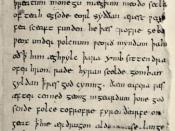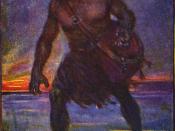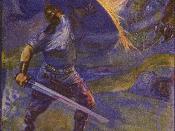What makes a "well loved lord" (20), an "honored prince" (88) or a "leader beloved" (1827)? Cultures as well as individuals have differed in their definitions of a successful king for generations. The epic poem Beowulf introduces two kings: Beowulf, the protagonist of the story, the famed hero who slays monsters with his bare hands and then becomes king of the Geats, and Hrothgar, the king of the Danish court, who is grateful for Beowulf's help in overcoming Grendel and his mother. A king received respect for wealth, fame, and warriors, during the time in which the poem Beowulf takes place. However, a king should go beyond these basic "needs" and become one with his people. This is achievable by depending on one's people instead of remaining independent, and acting rationally and logically rather than rashly. True Leaders delegate work rather than taking care of everything themselves, and think of consequences as well as limits.
Hrothgar succeeds in meeting all of these criteria, while Beowulf comes off short. Beowulf, a true hero rather than a true king, obtains wealth, fame, and warriors but acts independently and rashly, as a hero should.
Both Hrothgar and Beowulf present themselves as esteemed kings, because of their fortunes, fame and great bands of warriors. Throughout Beowulf the narrator uses such phrases as "well loved lord" (20), "honored prince" (88), and "leader beloved" (1827) to describe both Hrothgar and Beowulf. Hrothgar's transition to becoming a great king is described: "Hrothgar was granted glory in war, success in battle; retainers bold obeyed him gladly; his band increased to a mighty host" (38-41). As well as having a band of warriors which follow him gladly, Hrothgar gives out rings as rewards, and has a meadhall built, "mightier than man [has] known" (43). This...


